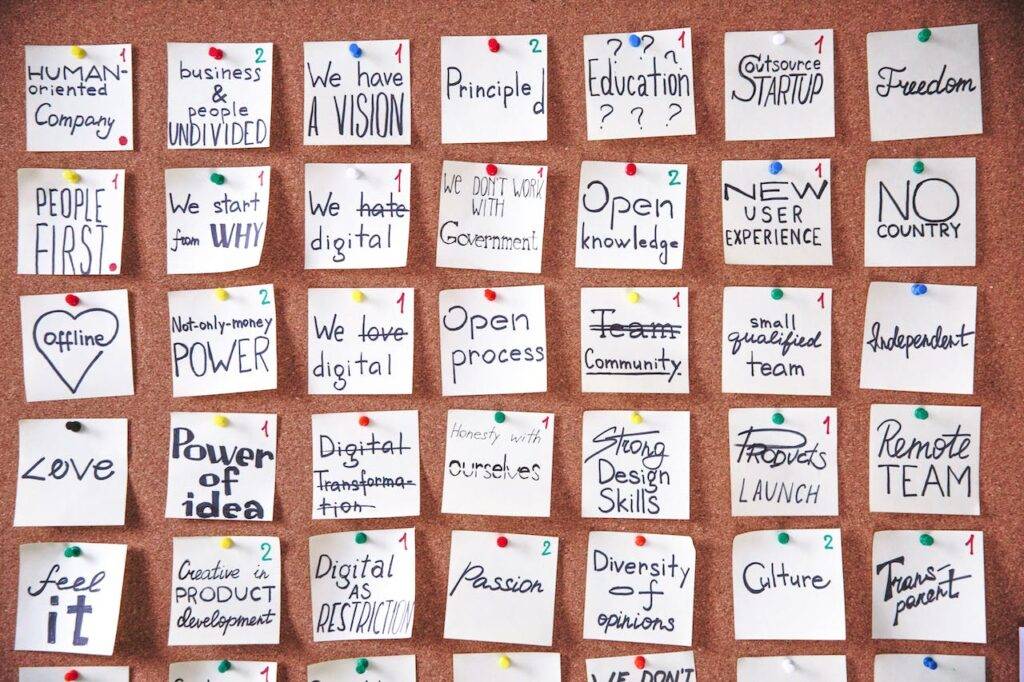5 Critical Things to Remember When Setting Your Yearly Goals
It might sound weird to say it, but most people don’t set goals. Sure, we like to dream about what we want to accomplish, but research shows most people don’t actually set goals. The most famous goal setting study was done at Harvard in the 80s. They found that 84% of students didn’t set any goals, 13% wrote down goals, and only 3% wrote down goals AND created a concrete action plan.
Now some of you might be saying to yourself, “this was in the 80s and this was focused on college students. It is now 2024 and there must be more people setting goals, especially at work.” Those people are correct, but they’re not as right as they think.
Modern research puts the estimate around 20% of people having clear written goals. True that is an improvement over 13%, but it means that 4 out of 5 people aren’t setting clear goals for themselves. And this is a shame, because setting goals is incredibly impactful. 10 years after the initial assessment, they followed up with the students. The 3% of people who had written down goals and created concrete actions were making ten times more money than the rest of the 97%.
In another study by Dr Gail Matthews (2015), people that had written goals, a concrete plan, and support from others accomplished significantly more than everyone else in the study. Other studies have linked setting goals to higher self-confidence, improved self esteem, increased levels of autonomy, and even significantly higher motivation to actually get stuff done (Locke & Latham, 2016). When taken together, the research clearly shows that setting goals not only improves your performance levels, it also improves your mental health.
The abundance of research should cause us to reflect upon our own goal setting. Are you setting clear and concrete goals for yourself? Are you motivating the people around you to set clear and concrete goals for themselves? Do you want to be a part of the 97% who dream but do nothing, or do you want to be the 3% who go further than they ever imagined?
5 Critical Things to Remember When Setting Your Yearly Goals

3 Core Beliefs About Work Goals
Research also shows that not all goals are alike. For the sake of this article, we are going to be focusing on Work Goals. These are the goals that are a part of your job. How you achieve these goals will go a long way in determining your performance level in your role (below expectations, successful, or exceeding expectations). But before you even try to set your work goals, it is important that you get in the right mindset.
That is why we have combed through the research and best practices to identify 3 core beliefs that should shape your performance goals.
- Dynamic – Work goals are not meant to be static, especially when it comes to longer goals. The desired outcomes and actions you take might seem right today, but maybe completely wrong 2 months from now. People get in trouble when they lock their goals, and ignore when circumstances require a change. So when you are setting your work goals, think of them as something you will continue to refine over time, not something you set in stone.
- Priority Focused – People get in trouble when they have too many work goals. They spread their attention too thin, and ultimately fail to reach the majority of their goals. That is why we recommend limiting your goals to around three or five. Limiting yourself also has the wonderful effect of narrowing your focus on the critical goals. Don’t waste your time tending the garden while your house burns down, and down waste your focus on the nice to achieve things while you ignore the critical priorities.
- Co-Owned – A lot of research shows that you are more likely to achieve your work goals if they are shared with another person or team. Part of this is due to holding each other accountable, and not wanting to let the other person down. The other part is due to the fact that additional people bring additional perspectives and thoughts. That additional perspective increases the likelihood of building a robust set of actions and correctly solving issues as they arise.
5 Critical Things to Remember When Setting Your Yearly Goals

5 Steps to Setting “Healthy Performance” Goals
To me, having the right mindset is the majority of the battle. If you set work goals following the three core beliefs, then you are significantly more likely to succeed. But the mindset isn’t the only important thing when setting your goals. I can set a goal to go to the moon, and even map out all the requirements for my journey, but that goal isn’t achievable. In order for you to set healthy and achievable work goals, we recommend you follow this five step process.
- Importance – Going back to our core belief on focusing on priorities, make sure that your work goal is actually important. At the same time, remember that importance might differ depending on who you ask. So make sure you get input from various stakeholders when creating your goals. We recommend you answer the following “Importance” questions when creating each goal:
- In your role, how can you impact and deliver the objectives of your team, your business unit, and ultimately your company’s strategy?
- Can you translate that impact into a high level goal?
- What impact will achieving this goal have?
- Why is it prioritized now?
- Desired Outcome – A lot of people fail in their work goals because they set goals that are too vague. Things like, “we need to grow our revenue” or “we need to deliver project X”. While these goals sound great, they are too fuzzy. Instead you need to accurately describe the desired outcome you want to achieve at the end of your goal. The following questions can help you refine your goals into “Desired Outcome” statements:
- What are the desired outcomes for this goal?
- What value will it deliver to your customers / key stakeholders?
- How will you know that you have achieved the desired outcomes?
- What outcomes would you expect to see if you accomplish the goal?
- Milestones – Once we have mapped out the desired outcomes you want to achieve with this goal, you can start mapping out the milestones you need to pass before you achieve your goal. These milestones will help you track your progression towards the goal, and ensure you keep heading in the right direction. You can create your milestones by answering the following questions:
- What are the first couple of milestones towards your desired outcome that will show your progression?
- Can you describe these milestones in terms of outcomes, not just actions you plan on taking?
- What would the desired timeline be for each of the milestones?
- Barriers / Enablers – None of us live in a perfect world, and there is no doubt that there are risks you will face in achieving your goal. Some of these will be in your direct control, while others will be outside of your control. Similarly, achieving your goal might be dependent on other teams or other projects. By answering the following questions, you can start preparing for the barriers or enablers you will face:
- What are the major barriers or issues you have to address in order to be successful in this goal?
- Are there any enablers that can support this goal?
- What can we do to address these barriers or take advantage of these enablers?
- Partners / Key Stakeholders – Finally, it is important to recognize that very few work goals are ever truly the responsibility of one person. You will always have some key stakeholders, colleagues, or even customers that you should gather input from. Sure they might not own the goal or actively work on it, but you still need them involved to some degree. You can identify which Partners / Key stakeholders you need by answering the following questions:
- Are there any colleagues who should partner with you on this goal?
- Who would be relevant stakeholders (internal and external) that you should align with?
- Should you partner with them to create a Shared Goal?
5 Critical Things to Remember When Setting Your Yearly Goals

Work Goals are critical, but don’t forget Growth Goals
This first article has all about how you can sustainably reach a high level of achievement by setting healthy work goals. But work goals aren’t the only type of goals you should be setting. You also need to be thinking about Growth goals. Your growth and improvement is a part of your job. So, it stands to reason that your growth should be captured in your goals and in how your performance is evaluated. If you aren’t growing, then you are just falling behind.
In the next Caveman article, we will do a deep dive into growth goals, and how you should incorporate them into your overall plan of what you want to accomplish this year.
5 Critical Things to Remember When Setting Your Yearly Goals

Leave a Reply